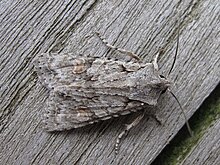Lithophane ornitopus
| Lithophane ornitopus | |
|---|---|

| |
| Scientific classification | |
| Domain: | Eukaryota |
| Kingdom: | Animalia |
| Phylum: | Arthropoda |
| Class: | Insecta |
| Order: | Lepidoptera |
| Superfamily: | Noctuoidea |
| Family: | Noctuidae |
| Genus: | Lithophane |
| Species: | L. ornitopus |
| Binomial name | |
| Lithophane ornitopus (Hufnagel, 1766) | |
| Synonyms | |
| |
Lithophane ornitopus, the grey shoulder-knot, is a moth of the family Noctuidae. The species was first described by Johann Siegfried Hufnagel in 1766 and is found in most of the Palearctic realm from Ireland east to Siberia.
Technical description and variation
The wingspan is 32–38 mm. Its forewings are grey white; a bifurcate black streak from base below cell; lines indistinct, pale with dotted edges; stigmata grey with partial black outlines and paler rings; the lower lobe of the reniform orange tinged; claviform sometimes connected by a black streak with outer line, and often a dark spot between the stigmata; submarginal line waved, white, preceded by dark marks; hindwing grey; the whiter forms are separated as ab. pallida Spul.[1]


Biology
Adults are on wing from late August to November and, after overwintering, again from the end of February to mid-May. The larvae are bluish green dotted with white; dorsal and subdorsal lines white; spiracular line yellowish white. The larvae feed on various deciduous trees, but mainly oak (Quercus species) and can be found from April to June. It overwinters as an adult.[2] It is mainly found at the edges of forest and meadow habitats as well as in heathlands and park landscapes.
Subspecies
- Lithophane ornitopus ornitopus
- Lithophane ornitopus pitzalisi Hartig, 1976 (Sardinia)
References
- ^ Seitz, A. Ed., 1914 Die Großschmetterlinge der Erde, Verlag Alfred Kernen, Stuttgart Band 3: Abt. 1, Die Großschmetterlinge des palaearktischen Faunengebietes, Die palaearktischen eulenartigen Nachtfalter, 1914
- ^ Robinson, Gaden S.; Ackery, Phillip R.; Kitching, Ian J.; Beccaloni, George W.; Hernández, Luis M. (2010). "Search the database – introduction and help". HOSTS – A Database of the World's Lepidopteran Hostplants. Natural History Museum, London.
- ^ László Ronkay, José Luis Yela, Márton Hreblay: Hadeninae II. - Noctuidae Europaeae, Volume 5. Sorø, 2001, ISBN 87-89430-06-9, S. 141–143
External links
- Kimber, Ian. "73.202 BF2237 Grey Shoulder-knot Lithophane ornitopus (Dadd, 1911)". UKMoths. Retrieved 18 January 2022.
- Savela, Markku. "Lithophane ornitopus (Hufnagel, 1766)". Lepidoptera and Some Other Life Forms. Retrieved 18 January 2022. Taxonomy
- Lepiforum e.V.
- De Vlinderstichting (in Dutch)
